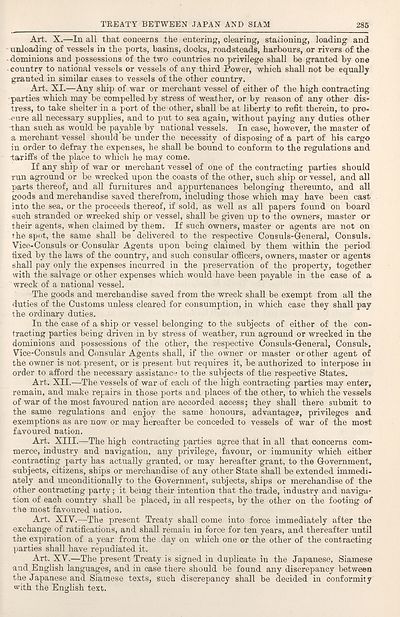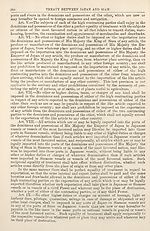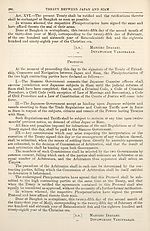1917
(365) Page 285
Download files
Complete book:
Individual page:
Thumbnail gallery: Grid view | List view

TREATY BETWEEN JAPAN AND SIAM
Art. X.—In all that concerns the entering, clearing, stationing, loading and
unloading of vessels in the ports, basins, docks, roadsteads, harbours, or rivers of the
dominions and possessions of the two countries no privilege shall be granted by one
country to national vessels or vessels of any third Power, which shall not be equally
granted in similar cases to vessels of the other country.
Art. XI.—Any ship of war or merchant vessel of either of the high contracting
parties which may be compelled by stress of weather, or by reason of any other dis¬
tress, to take shelter in a port of the other, shall be at liberty to refit therein, to pro¬
cure all necessary supplies, and to put to sea again, without paying any duties other
than such as would be payable by national vessels. In case, however, the master of
a merchant vessel should be under the necessity of disposing of a part of his cargo
in order to defray the expenses, he shall be bound to conform to the regulations and
Tariffs of the place to which he may come.
If any ship of war or merchant vessel of one of the contracting parties should
run aground or be wrecked upon the coasts of the other, such ship or vessel, and all
parts thereof, and all furnitures and appurtenances belonging thereunto, and all
goods and merchandise saved therefrom, including those which may have been cast
into the sea, or the proceeds thereof, if sold, as well as all papers found on board
such stranded or wrecked ship or vessel, shall be given up to the owners, master or
their agents, when claimed by them. If such owners, master or agents are not on
the spot, the same shall be delivered to the respective Consuls-General, Consuls,
Vice-Consuls or Consular Agents upon being claimed by them within the period
fixed by the laws of the country, and such consular officers, owners, master or agents
shall pay only the expenses incurred in the preservation of the property, together
with the salvage or other expenses which would have been payable in the case of a
wreck of a national vessel.
The goods and merchandise saved from the wreck shall be exempt from all the
duties of the Customs unless cleared for consumption, in which case they shall pay
the ordinary duties.
In the case of a ship or vessel belonging to the subjects of either of the con¬
tracting parties being driven in by stress of weather, run aground or wrecked in the
dominions and possessions of the other, the respective Consuls-General, Consuls,
Vice-Consuls and Consular Agents shall, if the owner or master or other agent of
the owner is not present, or is present but requires it, be authorized to interpose in
order to afford the necessary assistance to the subjects of the respective States.
Art. XII.—The vessels of war of each of the high contracting parties may enter,
remain, and make repairs in those ports and places of the other, to which the vessels
of war of the most favoured nation are accorded access; they shall there submit to
the same regulations and enjoy the same honours, advantages, privileges and
exemptions as are now or may hereafter be conceded to vessels of war of the most
favoured nation.
Art. XIII.—The high contracting parties agree that in all that concerns com¬
merce, industry and navigation, any privilege, favour, or immunity which either
•contracting party has actually granted, or may hereafter grant, to the Government,
subjects, citizens, ships or merchandise of any other State shall be extended immedi¬
ately and unconditionally to the Government, subjects, ships or merchandise of the
other contracting party; it being their intention that the trade, industry and naviga¬
tion of each country shall be placed, in all respects, by the other on the footing of
the most favoured nation.
Art. XIV.—The present Treaty shall come into force immediately after the
exchange of ratifications, and shall remain in force for ten years, and thereafter until
the expiration of a year from the day on which one or the other of the contracting
parties shall have repudiated it.
Art. XV.—The present Treaty is signed in duplicate in the Japanese, Siamese
and English languages, and in case there should be found any discrepancy between
the Japanese and Siamese texts, such discrepancy shall be decided in conformity
with the English text.
Art. X.—In all that concerns the entering, clearing, stationing, loading and
unloading of vessels in the ports, basins, docks, roadsteads, harbours, or rivers of the
dominions and possessions of the two countries no privilege shall be granted by one
country to national vessels or vessels of any third Power, which shall not be equally
granted in similar cases to vessels of the other country.
Art. XI.—Any ship of war or merchant vessel of either of the high contracting
parties which may be compelled by stress of weather, or by reason of any other dis¬
tress, to take shelter in a port of the other, shall be at liberty to refit therein, to pro¬
cure all necessary supplies, and to put to sea again, without paying any duties other
than such as would be payable by national vessels. In case, however, the master of
a merchant vessel should be under the necessity of disposing of a part of his cargo
in order to defray the expenses, he shall be bound to conform to the regulations and
Tariffs of the place to which he may come.
If any ship of war or merchant vessel of one of the contracting parties should
run aground or be wrecked upon the coasts of the other, such ship or vessel, and all
parts thereof, and all furnitures and appurtenances belonging thereunto, and all
goods and merchandise saved therefrom, including those which may have been cast
into the sea, or the proceeds thereof, if sold, as well as all papers found on board
such stranded or wrecked ship or vessel, shall be given up to the owners, master or
their agents, when claimed by them. If such owners, master or agents are not on
the spot, the same shall be delivered to the respective Consuls-General, Consuls,
Vice-Consuls or Consular Agents upon being claimed by them within the period
fixed by the laws of the country, and such consular officers, owners, master or agents
shall pay only the expenses incurred in the preservation of the property, together
with the salvage or other expenses which would have been payable in the case of a
wreck of a national vessel.
The goods and merchandise saved from the wreck shall be exempt from all the
duties of the Customs unless cleared for consumption, in which case they shall pay
the ordinary duties.
In the case of a ship or vessel belonging to the subjects of either of the con¬
tracting parties being driven in by stress of weather, run aground or wrecked in the
dominions and possessions of the other, the respective Consuls-General, Consuls,
Vice-Consuls and Consular Agents shall, if the owner or master or other agent of
the owner is not present, or is present but requires it, be authorized to interpose in
order to afford the necessary assistance to the subjects of the respective States.
Art. XII.—The vessels of war of each of the high contracting parties may enter,
remain, and make repairs in those ports and places of the other, to which the vessels
of war of the most favoured nation are accorded access; they shall there submit to
the same regulations and enjoy the same honours, advantages, privileges and
exemptions as are now or may hereafter be conceded to vessels of war of the most
favoured nation.
Art. XIII.—The high contracting parties agree that in all that concerns com¬
merce, industry and navigation, any privilege, favour, or immunity which either
•contracting party has actually granted, or may hereafter grant, to the Government,
subjects, citizens, ships or merchandise of any other State shall be extended immedi¬
ately and unconditionally to the Government, subjects, ships or merchandise of the
other contracting party; it being their intention that the trade, industry and naviga¬
tion of each country shall be placed, in all respects, by the other on the footing of
the most favoured nation.
Art. XIV.—The present Treaty shall come into force immediately after the
exchange of ratifications, and shall remain in force for ten years, and thereafter until
the expiration of a year from the day on which one or the other of the contracting
parties shall have repudiated it.
Art. XV.—The present Treaty is signed in duplicate in the Japanese, Siamese
and English languages, and in case there should be found any discrepancy between
the Japanese and Siamese texts, such discrepancy shall be decided in conformity
with the English text.
Set display mode to:
![]() Universal Viewer |
Universal Viewer | ![]() Mirador |
Large image | Transcription
Mirador |
Large image | Transcription
Images and transcriptions on this page, including medium image downloads, may be used under the Creative Commons Attribution 4.0 International Licence unless otherwise stated. ![]()
| Asian directories and chronicles > 1917 > (365) Page 285 |
|---|
| Permanent URL | https://digital.nls.uk/194537053 |
|---|
| Attribution and copyright: |
|
|---|---|
| Description | Volumes from the Asian 'Directory and Chronicle' series covering 1917-1941, but missing 1919 and 1923. Compiled annually from a multiplicity of local sources and research. They provide listings of each country's active corporations, foreign residents and government agencies of all nationalities for that year, together with their addresses. Content includes: various treaties; coverage of conflicts; currencies and taxes; consular fees; weights and measures; public holidays; festivals and traditions. A source of information for both Western states and communities of foreigners living in Asia. Published by Hongkong Daily Press. |
|---|---|
| Shelfmark | H3.86.1303 |
| Additional NLS resources: |

